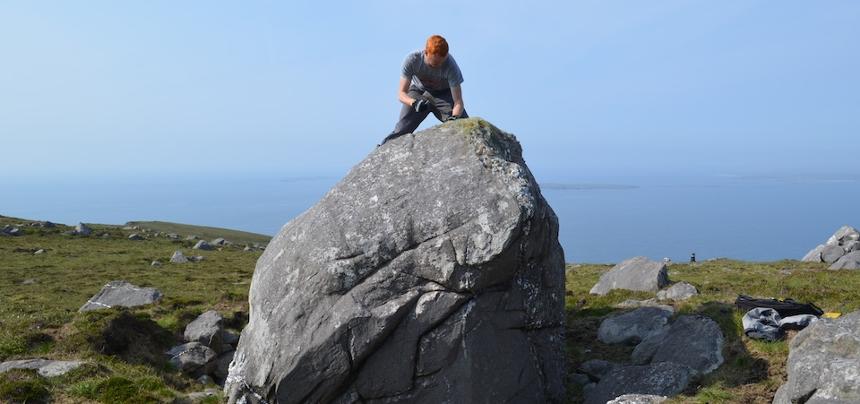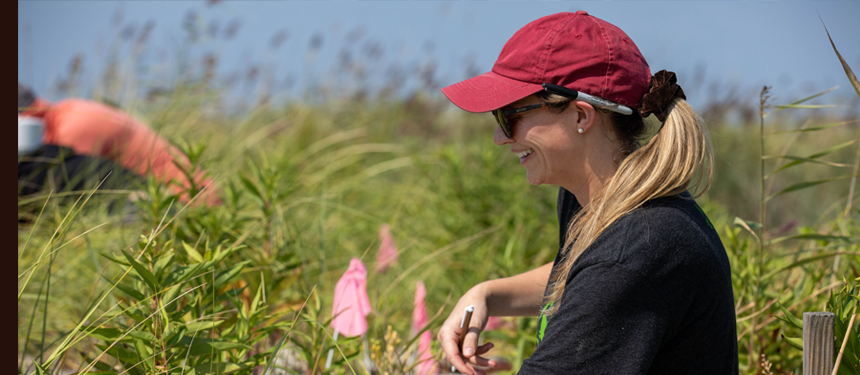Research
Research
Research in the Department of Geology
The mission of the Department of Geology is, at its core, the drive to understand global environmental change. This is evident in our research in paleontology, paleoclimate, and planetary science. Our research seeks to answer fundamental questions about the world we live in: How did the Earth form? What inhabited the Earth before us? What are the fundamental processes that change the flora and fauna? How has climate shaped the world we see? What are the processes that have changed climate in the past? And, how are we, as a species, altering Earth's climate today?
The Department of Geology is committed to providing Rowan students a comprehensive Geoscience education. We believe that such an education is rooted in experiential learning through active participation in research. Rowan students work alongside faculty in the laboratory and the field, and are well positioned for careers in the geosciences, public service and private industry, as well as continuing education and research.
Paleontology Research
Drs. Paul Ullmann, Kristyn Voegele, and Zach Boles, and School of Earth and Environment Dean Ken Lacovara are vertebrate paleontologists. Their research is done both in the laboratory and the field, from advanced molecular laboratories in North Carolina to field sites in the deserts of Argentina, and the badlands of South Dakota, Montana, and at the Jean and Ric Edelman Fossil Park at Rowan. We have dedicated paleontology tools and labs that provide unparalleled insight into the last moments of the Cretaceous. Research interests include molecular analyses of ancient proteins, 3D modeling of dinosaur joint motions, analysis of predator-prey relationships in ancient environments, and advancing our understanding of the K/Pg boundary, when the reign of the 'terrible lizards' suddenly ended and new forms (mammals) took over the Earth.
Paleoceanography and Paleoclimatology
Documenting how climate has changed allows us to understand the mechanisms that drive such changes and the processes that feedback to amplify or dampen forcing signals. Dr. Gerald Rustic is a palaeoceanographer and paleoclimatologist studying past changes in Earth's climate. This research involves samples from the depths of the oceans, isotope geochemistry, statistical analysis, mass spectrometry, laser ablation, optical emission spectrometry, microscopy, and a lot of patient, painstaking work. Dr. Rustic's research group, the Rowan Oceanographic and Paleoceanographic Investigation Center - TROPIC - investigates climate variability at human timescales, on millennial timescales, and at glacial-interglacial timescales. Their work looks to understand how the major modes of climate variability, including the El Nino Southern Oscillation (ENSO) and the Atlantic equatorial mode, or Atlantic Niño, are related to large scale climate background conditions. In addition, they investigate trace elements in the environment and work on the development of novel techniques and methods to extract more information from climate archives. This work to better characterize and understand past climate will help better predict how climate may change in the future.
Planetary Geology
Founding Chair Dr. Harold Connolly is a cosmochemist who studies the composition of extra-terrestrial objects to infer the early composition of the solar system, and from this the formation of the Earth. Dr. Connolly's research is fundamental to understanding how the Earth came to be. He is the Mission Sample Scientist on NASA's New Fontiers 3 asteroid sampe return mission, OSIRIS-REx and Co-I on JAXA's Hayabusa2 asteroid sample return mission. These missions will retrieve samples from distant asteroids whose composition will reveal, for the first time, the early composition of the solar system.
Paleoclimatology and Glacial Geology
Earth's recent past has been dominated by the advance and retreat of large ice sheets. The evidence for this glacial activity is all around us and has shaped our modern world. The timing and mechanism of deglaciation is key to understanding the cryosphere - Earth's ice - response to a warming climate. Dr. Aaron Barth uses cosmogenic nuclide exposure dating to understand ice sheet processes, the timing and extent of glaciations, and how the deglaciation proceeded. At the Rowan Cosmogenic Nuclide Lab (RCNL), Dr. Barth and his research group examine the geochemical signals in rocks exposed by ice activity to determine the timing and specific processes of glacial retreat. By understanding how past deglaciations proceeded, we can better understand how the cryosphere will respond to modern warming conditions. This melting ice contributes to sea level rise, an existential threat to the New Jersey shore and to coastal communities world-wide. A better understanding of glacial processes means an improved ability to forecast future sea level rise and impacts, allowing for planning and mitigation.
Sedimentology and Stratigraphy
The dynamic surface of the Earth is shaped by the movements of wind and water that transport sediments. By studying ancient sedimentary basins (deposits that can be hundreds of millions of years old), and modern sedimentary processes deposits, we can reconstruct past environments and landscapes that may have been drastically different from what we know of our modern planet. Dr. Lily Pfeifer is a sedimentologist who is interested in reading the sedimentary rock record to learn about past Earth system extremes. Her field work takes place everywhere from the South of France, to the middle of the United States, and Alaska, with more local projects near the South Jersey shore and in the Appalachian Mountains.



